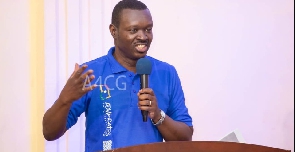Mr Fred F. Antoh, Ashanti Regional Chairman of the New Patriotic Party (NPP), has told Ghanaians to be wary of what he described as the “political mischief and diversionary tactics” adopted by the National Democratic Congress (NDC) to create disaffection for the government.
He said it was quite amazing that “those who for close to two decades supervised the loot and rot of the country’s economy should remain unrepentant and persist in a campaign of falsehood to pull wool over the eyes of the people”.
Mr Antoh was addressing a get-together organised for NPP supporters in the Ahafo-Ano South constituency at the instance of the Member of Parliament (MP), Mr Stephen Kwaku Balado-Manu at Mankranso on Sunday.
He noted that clearing the mess left behind by the NDC was not an easy job and that the government’s achievements within its 18 months in office, had been remarkable.
The NPP Regional Chairman asked supporters of the party to go on the offensive to explain government’s policies and programmes so as to expose the lies, misinformation and distortions peddled by their opponents.
He called for internal peace and harmony within the party to enable it to focus on winning the 2004 Presidential election in round one and capture more parliamentary seats.
Mr Balado-Manu said people in the constituency had already started seeing signs of the positive change promised by the NPP, citing the construction of the Mankranso-Beposo-Tepa road at a cost of 39 billion cedis and the employment of over 10,000 people for the mass cocoa spraying exercise.
He announced plans by the government to introduce Valley Bottom Rice Project in the area and called on the people to organise themselves into co-operative so as to benefit from credit facilities for the project.
Mr Balado-Manu asked beneficiaries of credit facilities to expand their economic activities to pay back such loans to avoid prosecution.
The MP for Tano-South, Mr Adjei Yeboah, urged Ghanaians to bear with the government as it pursued pragmatic policies to turn the economy around.
He said they should remain solid in their support and faith in the NPP, adding that the government’s achievements within its four-year term would convince and win the admiration of even its opponents.
In another development the GNA reports that Nana Pra Agyensaim, Member of the Council of State, on Saturday said criticism of institutions under the constitution should be taken in good faith to “fine tune” the country’s democratic culture.
He said, “we don’t want dictatorship in governance that was the more reason why we have constitutional bodies like the Commission for Human Rights and Administrative Justice (CHRAJ), the National Commission for Civic Education (NCCE) and the Media Commission) to enhance their policing role in democratic rule”.
Opening a two-day Review Workshop on CHRAJ at Akosombo last Saturday he said the verbal attack on Mr Emile Short, Commissioner of CHRAJ by some politicians for allegedly criticising the government on some of its policies were uncalled for.
The Council of State Member reminded politicians that constitutional bodies like CHRAJ were above partisan politics.
“Politicians may come and go but the bodies remain for the development of democracy and their contribution to fine tuning democracy should be paramount”.
Nana Agyensaim said such bodies should be helped to grow and discharge their duties efficiently, adding that, there was the need for a healthy relationship between them and Parliament.
The workshop was organised by the Centre for Democratic Development (CDD) and sponsored by USAID for members of the Parliamentary Committee on Constitutional, Legal and Parliamentary Affairs on “Mandate and Jurisdiction of CHRAJ, its funding and relationship with the Executive, Parliament and other Executive Branches”.
Professor Emmanuel Gyimah-Boadi, Executive Director of CDD, said it was aimed at reviewing the operations of CHRAJ and Parliament to enhance their capacity to fight corruption and ensuring accountability in public administration.
He expressed the hope that the workshop would produce “inputs that would help advance the cause of development”.
General News of Tuesday, 23 July 2002
Source: GNA
















